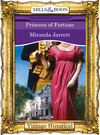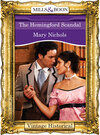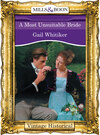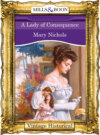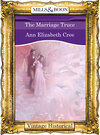Kitabı oku: «Princess of Fortune», sayfa 4
He could not imagine being so entirely adrift in a foreign country. The navy had always been there to support him even if his family and friends had not, and he marveled at the strength this small young woman must possess, forced to depend upon strangers for so much.
“Is there any reason beyond politics that someone would want you dead?” he asked. “Did you bring with you anything of great value? Gold, jewels, paintings?”
She sniffed with indignation. “Lady Willoughby could tell you that. Recall how she and her staff have searched my belongings.”
True enough. That search would have served its purpose, even though Tom didn’t like the notion of her having so little privacy. If anything of real interest had been discovered, then the admiral would likely have relayed it to him.
“Well, then, another reason. Someone who is jealous of your position or rank, or the fact that you escaped while they were forced to remain?”
“No,” she said sadly. “My life has not been so interesting as that. Besides, most Monteverdians would consider my escape a banishment, not something to be envied.”
“There is no one?” He hesitated, wishing he did not have to ask this. “No, ah, no fiancé, or lover?”
“By all the saints in heaven, of course I had no lover!” Her indignation was rising to such heights that he half expected to smell smoke where she’d scorched the carpet. “No Monteverdian princess would dare take a lover before she was wed, and before she’d given her royal husband a legitimate heir.”
“I understand, ma’am,” he said hastily. “You don’t have to say more.”
“But I do,” she insisted, “because you do not understand, else you would never have asked. To risk bearing a bastard child of impure blood, to lose all my value as a bride to any respectable royal house, to sully my family’s name, to be forced to surrender my dowry—I would not do that, Captain, never. Never.”
Oh, hell. Now he’d made a right royal mess, hadn’t he?
“I didn’t say that you had done any of that, ma’am,” he said, wishing desperately for a way to withdraw that particular question. “I was only trying to, ah, to learn if there was anyone else who might wish you harm.”
“Harm, ha,” she said darkly, and muttered some black, incoherent words in Italian that he was certain must be a curse. “I could show you harm, which is what you deserve for that. Because I know exactly what you meant. I may be a virgin, but I am not a fool.”
He felt himself flush again, something that had not happened since his voice had cracked at age twelve. But then, he could not recall ever having had any woman, young, old, or in between, speak to him so frankly of her virginity.
No wonder he was feeling mortifyingly out of his depth, and sinking fast.
“I assure you, ma’am, there was no disrespect—”
“No more of your assurances.” Suddenly she was standing between him and Homer, her dark eyes full of sparks and a fierce tilt to her chin that had nothing shy about it. She snapped her fingers before him, as if to flick away the word itself. “No more of your harms, and your coincidences, and—and no more of your ridiculous ‘ma’am’s,’ either. It is the insipid sound a nanny goat makes, and it does not please me.”
He frowned down at her. He’d always respected titles and ranks, whether it was a senior officer, or his father the earl, and he wasn’t sure why anyone would choose to do otherwise.
“But ‘ma’am’ is the proper way to address you. Even our own queen is called ‘Your Majesty’ only for the first greeting, and ‘ma’am’ after that.”
“I am not your queen, am I?” Her frown matched his. “I am different. You are different. You are the only Londoner who has spoken to me in my own language, and it seems most barbarously wrong of you not to call me by my given name while we converse.”
“Call you by your Christian name?” he asked, incredulous. His experience with ladies might be limited, but he did know that most did not wish to be addressed after a few hours’ acquaintance with the same jolly familiarity used with a drinking crony in a tavern. Here he’d been worrying that he’d been too free, yet she was offended instead by his being too formal.
“Yes, yes. It will give me great comfort, and be so much better than the nanny-goat bleat.” She nodded with satisfaction, as if everything had been decided. “Whenever we are alone, or speaking Italian as we are now, you will call me Isabella. I give you leave. We will speak as friends, eh?”
How could he possibly refuse her when she’d no other real friends in the entire country? How cruel would it be to turn down such a humble request?
She snapped her fingers again, now less from annoyance than for emphasis. “In turn I shall call you whatever your name might be instead of ‘Captain.’ You do have another, don’t you?”
“It’s Thomas,” he said reluctantly. “Tom for short. But I’m not certain this is—”
“Thomas,” she repeated, testing the sound of the name. “Tom. Tomaso. That will do. Ah, here is that lazy maid at last with my chocolate. Set it down there, on that table.”
Tomaso: no one had called him that since he’d been a boy traveling the Continent with his family. Yet from her lips it sounded different, a silky, luxuriant ripple that couldn’t possibly refer to him.
So how in blazes was he supposed to say her name? “Ma’am” might sound like a goat’s bleat to her, but at least it had none of the sinuous, sensuous entrapment of Isabella.
He was saved for the moment as the servants entered with her requests, and he watched her dictate to them with appalling precision. The maid must place the silver tray with the chocolate pot and toast here, squared to the edge of the table. The footman must present the basin of water, holding it steady while she dipped one fingertip into the surface to judge the temperature, and then place it before the wicker-backed chaise, with the linen cloth folded in half over the arm.
“I know you judge me to be too picky, Tomaso,” she said once the servants left. “Perhaps I am. But there is a proper way for things to be done, and an improper one, as well. If standards aren’t kept, why, then, civilization is meaningless, and we should just as well go back to grunting and rooting about naked in the dirt like little piglets.”
“Yes, ma’am.” The unbidden image of her naked made him forget her request.
“Isabella,” she corrected him, fortunately unaware of his true thoughts as she sat on the settee and swung her legs up before her. “You will call me Isabella. Now be an honorable gentleman, and look away while I tend my sorry knees.”
But it was already too late for honorable discretion. Without waiting for him to oblige, she’d pulled her skirts up high over her garters and bent over to inspect her bruised, scraped knees.
She winced as she dribbled the cool water over them, then glanced up at Tom through her lashes.
“I told you to look away,” she said, wrinkling her nose and mouth at the sting of the cold water. “You are not being honorable.”
“Damnation, you have not given me the chance before you go and hike up your skirts!” he sputtered. She was wearing yellow lisle stockings with dark blue garters, the ribbons embroidered with red roses that, unfortunately, matched the scrapes on her knees—pale, plump knees which, scraped or not, were still quite fine to look upon. “What honorable lady would do such a thing, I ask you, let alone ask a gentleman to ignore it?”
She blinked, not at all embarrassed. “But I am not an honorable English lady, Tomaso. I am a princess, and I am entitled to ask whatever I please.”
He took a deep breath, making himself once again look at her face, an event that seemed to be happening far too frequently with her.
“Not that, ma’am,” he said as firmly as he could. “My orders regard your safety and well-being, not your—your modesty.”
“My modesty. How very English that sounds!” She grinned, and widened her eyes for emphasis. “Well, then. You have reasoned this better than any periwig judge. Since we are in England, I rescind my order. Look at my sad little knees if you wish, and I shall not protest.”
With a groan of frustration he dropped into the chair across from her, wondering if even one of those great admiralty lords had any idea of what he was going through.
“Why the devil aren’t you having one of the lady’s maids tend to you? What reason could you have for doing this here instead, except to plague me?”
“Because you are the only one who knows how it happened,” she said, dabbing at her knees. “I was impulsive and—and unwise. Stepping from a carriage without waiting for the step is something a simpleton would do, not a princess. The maidservants in this house whisper about me enough. They do not need to see that I have skinned my knees like a clumsy child. But you—I cannot have such a secret from you, can I?”
He hadn’t expected that. “You are fortunate you weren’t more badly hurt,” he said gruffly. “You could have broken your leg, or worse.”
“I’m fortunate in a great many ways, I suppose.” She dried her knees and flipped her skirts back down, smoothing them around her ankles for good measure. “I could also have been stabbed with a pair of embroidery scissors which, given my ineptitude at handwork, would have been most ironic.”
He frowned grimly. He supposed it was good that she could make light of it, but he could not. “‘Ironic’ isn’t the word I would have chosen.”
“It is better than the alternative, yes?” Her smile turned wistful. “What happened today in that shop was not your fault, Tomaso. You couldn’t have stopped more than you did. I have lived most of my life with the whole world watching, and I know no other way.”
“But I shouldn’t have let you go into that infernal shop in the first place.”
“That’s because you believe the best way to keep me safe is to lock me away, but that won’t do for me, not at all.”
She smoothed a stray lock of hair behind her ear, her smile turning bittersweet. “On my family’s crest are three lions, brave and fierce and ready for any challenge. That is how I am, too, Tomaso. Why else would I have come all this way on my own, away from my family and my home? I would rather face life with a roar than hide and quake with my hands over my eyes. Can’t you understand that, Tomaso, even being English?”
He grumbled, but he nodded, because it was the easiest reply, if not the best.
But he understood, all right. He understood that he was becoming more and more tangled in the complicated life of this small, fierce lioness, and there wasn’t a blasted thing he could do about it.
With her legs curled up beneath her, Isabella sat in the center of her bed and listened. She’d always been good at listening, particularly like this in the dark. There were a great many things that could be learned that way, stray bits and scraps of interesting information that others tossed away without a thought, information that could prove most useful.
Consider all she’d learned of Lord and Lady Willoughby and their establishment in the few short weeks that she’d been their guest. Simply by listening, she’d learned that the earl stayed downstairs drinking long after the countess had retired, and that when he finally came upstairs—his footsteps unsteady, muttering to himself—he’d go not to his wife’s bed, or even his own, but up another flight of stairs to the servants’ rooms, where he’d make the kitchen maid’s iron bedstead squeak off and on all night.
Isabella herself did not care about the earl’s proclivities. She’d certainly overheard worse things in her parents’ palace. The earl was a man, and a lord; he could do what he pleased. But because all the other servants seemed to know, too, the house was closed for the night far earlier than was fashionable, the fires banked, the candles doused, and everyone in their beds. But for Isabella, the moment she heard the earl’s footsteps meant the moment she knew she’d be undisturbed. Until morning, there’d be no more servants knocking at Isabella’s door, no more invented reasons for the countess to come chirping into her rooms, hoping to discover who knew what. Locking her bedchamber door was useless, for the countess held the keys to all the rooms in the house, and had no reluctance to use them.
So in the dark Isabella listened, straining her ears, and smiled when she finally heard those last footsteps of the day. The door upstairs opened and shut, and Isabella hopped off her bed. Barefoot, so she’d make as little noise as possible, she lifted the chair from her dressing table to the top of the trunk at the end of her bed. Then she climbed up first onto the trunk and then the chair, steadying herself with one hand around the bedpost. Her heart was racing with excited dread, and she had to remind herself to take care, and not fall again as she had earlier.
Now she could see over the top carved wooden frame that supported the bed’s curtains. The bottom of the frame was lined with the same brocade as the curtain, gathered into a showy sunburst over the mattress, but the top, here where no one would ever see, was covered by a stitched piece of coarse muslin, tacked into place only in the corners. Using a butter knife that she’d kept from her breakfast tray for the purpose, Isabella pried the tacks free, slowly peeled back the muslin and sighed with relief.
There, sandwiched between the lining and the muslin, lay the quilted linen petticoat of her traveling clothes, the skirts spread out in a fan so the outline wouldn’t show from below. Gently she touched the petticoat, reassuring herself that it hadn’t been touched, and again whispered thanks to her mother for suggesting such a clever hiding place. No one, certainly not foolish Lady Willoughby, would ever think to look here.
Lightly she traced one quilted channel, her fingers following the lumpy outlines of the treasure stitched within for safekeeping. Scores of gold coins, each stamped with the Fortunaro lions, were only the beginning. The real prize was the oval rubies, big as pigeon’s eggs and set in hammered gold, that had been in her family since the first Fortunaro had stolen them from the Caesars in Rome and made them the centerpiece of the crown jewels, a symbol of everything grand in her country.
On the voyage to England, the sheer weight of the petticoat and its hidden treasure had been a constant burden to Isabella, but that was nothing compared to the responsibility that had pressed upon her every minute since she’d left Monteverde. Not even her father the king had known she had the jewels, and Mama had made her swear terrible oaths never to tell another.
Isabella’s fingers stilled over the largest ruby, the one etched with the Fortunaro lion. Captain Lord Thomas Greaves had asked her if she’d anything that someone would kill her for. She hadn’t answered him honestly about that, nor had she told him how she’d seen the little triangle made of twigs around the woman’s neck. She couldn’t, not without raising too many other questions she’d no wish to answer. But he’d listened to her, anyway, and the readiness with which he’d accepted her evasion had saddened her no end.
How could it not? He was appallingly masculine in a rough English way, and if she were a sleek Italian lioness, then he was surely the model for the blustery wild lion that stood behind the British throne. No wonder she’d been drawn to him the moment she’d entered the drawing room, and no wonder, too, that she’d wanted to kiss him this afternoon, a giddy, foolish impulse that she’d regretted at once.
Flirtation was not why she’d been sent on this journey. She was not here to amuse herself with the man assigned to watch over her, no matter how broad his shoulders might be, or that he alone in London had made the effort to speak her language. In the long, long lineage of the Fortunaro, she was an insignificant nothing, except for what she might do now for her family’s honor.
As if to remind herself, she touched the jewels one last time before she pulled the muslin back in place and pressed the tacks back into the corners with her thumbs. But instead of climbing down to the floor, she slumped wearily on the chair, her hands resting on her bruised knees and her bare legs dangling over the chest.
She liked Tom Greaves, and she trusted him, and if they’d been born any other two people in this world, then that would have been plenty. But not only were those rubies hidden in the canopy reason for someone to pursue her; for a Monteverdian princess, they were also reason to die.
With a little sob, Isabella buried her face in her hands, and gave in to the unfairness that had become her life.
Chapter Five
T om walked down the empty street toward the river, wanting no other company than his own. He’d given up trying to sleep any longer in his unfamiliar bed in Lady Willoughby’s guest room, and had set out from the silent house when the skies were still dark, or at least as dark as they ever were in London. Now the first light of dawn was pinking the horizon, and heavy-eyed linkboys were going from light to light, dousing the night’s flames for the coming day.
The early morning was chill, damp with dew that had fallen like a silvery haze over the dark wool of Tom’s uniform coat, and his breath showed before his face. Yet still he walked on, lengthening his stride in the foolish hope that exercise alone would be enough to ease his restlessness.
The princess had been in his life for barely a day, and she already threatened to overwhelm it, and him. He’d always thought of himself as a strong, honorable man, proud to do what was right yet able to do what was necessary. Not even the surgeon’s grim predictions had been able to change that.
But in a single day, the princess had managed to shake all his careful notions of what was right. There was much of her that wasn’t right, not at all: she was illogical and demanding and impetuous. Yet she’d also shown herself to be brave and clever and far, far too charming for any male’s peace of mind. The worst trial for Tom was that for the life of him, he couldn’t begin to predict which side of herself she’d decide to show next. The only certainty seemed to be that she’d do exactly as she pleased, with no concern for the outcome.
That, and that she was his responsibility.
Damn. Damn, damn, damn.
When it had only been a matter of grabbing the seamstress with the scissors, he’d acted from instinct and training. That had been easy. If guarding her were no more challenging than that, he’d be sleeping peacefully now, not stalking about London like a lunatic.
But what in blazes was he supposed to do when she turned her face up to be kissed? How was an officer of the king to respond when she’d lifted her skirts and dared him to look at her knees? Exactly where in those infernal orders did it tell him when he was allowed to be a man first, and an officer second?
He didn’t realize how loudly he was grumbling to himself until he saw the stray dog skitter out of his path, tail between his legs and the fur bristling on his neck. Wonderful. Next he’d cause small children to weep and their mothers to faint.
At least he’d reached the Thames. The river was hardly the sea, but to Tom any water was a better vista than another brick wall. He always liked this time of day at sea, too, when the water was just beginning to come to life. The dawn’s pale light dappled the surface, and boats of every size and shape were already cutting across the water, carrying geese to the market, bales of tea from the East India men, a party of drooping revelers bound for their beds and a solitary navy officer being rowed in his ship’s gig to the steep steps of the offices at Whitehall. This last made Tom sigh with frustration, and stare longingly down the river to where the oceangoing ships were moored.
Someday one of those ships would be his again. Someday he’d have another command, a ship and crew and a gig of his own.
Someday, that is, if the Princess di Fortunaro weren’t the death of him first.
With one last muttered oath, Tom pushed open the heavy door of the Anchor, a coffeehouse that catered to navy officers from the nearby Admiralty offices. It was early here, too, but the Anchor kept seagoing hours, even marking the time for its patrons in watches rather than landsmen’s hours and minutes.
He breathed deeply of the welcoming scents of roasting coffee beans and steaming chocolate, mingled with the richer tang of frying bacon from the kitchen. Even so, the room was still nearly empty. Tom liked it that way, especially in his present mood. He took a place at a table near the window, one with the day’s first newspapers waiting in a neat pile for customers, and set his hat on the table beside it. A boy brought him an earthenware mug of coffee, and resolutely Tom reached for the topmost paper, determined to find first the news that he dreaded the most.
He didn’t have far to look. Directly after the war reports from the Continent and a debate in the House came the story that most of London would devour with their tea and eggs.
The list of beautiful & noble refugees to our shores has acquired a new & most notable addition, viz. Her Royal Highness Isabella, Princess di Fortunaro of the Kingdom of Monteverde. Though the princess is said to have resided in Berkeley Square for several weeks, a guest of the Countess of Vaughn, only yesterday did she boldly venture forth to explore the amusements of the highest ton. She is in truth an original beauty of rare style & rich elegance, her ancient blood granting her regal carriage & distinction.
Alas, her first outing in our fair city was marred by an attack against her person by one of the tyrant Buonaparte’s handmaidens, one Maria Corelli by name. Only the courage & agility of Captain Lord Thomas Greaves, son of the Earl of Lechmere and already an honored HERO in the service of his country, saved the princess from certain death & tragedy. While others could but quake with terror, the captain, at great risk to his own person, intercepted the villainess, & disarmed her before any violence was wrought. Though faint with terror, the princess was most gracious in her gratitude.
We can only pray that the Captain will continue to attend her & guard her, and offer to us the instructive & pleasurable image of BEAUTY & BRAVERY joined together.
Rubbish, all of it. The princess hadn’t been “boldly venturing forth” into that shop, unless those were the words that news scribblers preferred to “tripping” or “falling.” He’d agree that she was an original beauty, though even he knew that was a backhanded way of complimenting a lady whose appearance fell outside conventional tastes, but who was also too well-born or powerful to insult.
But this nonsense about him being a hero, and gallantly saving her from death and tragedy, and uniting beauty and bravery—well, that was about the most stupid cock and bull he’d ever read, and with another oath of disgust he turned to the next paper.
This one was worse. Here he’d “laid down his life to save the swooning princess.” He’d done no laying, and she’d done no swooning. In fact, when he recalled how hard the princess had fought him in the carriage, she probably could have dispensed with the seamstress herself, without any assistance from him.
The third paper turned Mrs. Copperthwaite’s shop into a scene of Shakespearean carnage, with wounded footmen spurting blood, screaming women, and the Brave Heroic Captain wrestling the Foreign Villainess to the floor before the woman stabbed herself fatally through Her Very Heart.
But despite how far-fetched these stories were, each one contained the same troubling truths. They announced the princess’s arrival in London. They told the world exactly where she was staying. They made her sound wealthy. And they announced to every vainglorious or violent dimwit in London that the surest path to seeing his or her name in the papers was to attack the Princess di Fortunaro.
“Ah, Greaves, I didn’t expect to find you here!” Without waiting for an invitation, Admiral Cranford settled himself into the chair beside Tom’s. He waved at the newspapers, his wide, ruddy face beaming. “Reading about your glorious escapades, are you? Didn’t I say you were the proper man for this assignment?”
But Tom wasn’t beaming in return. “Forgive me, sir, but I do not see the glory in this. If I had done my duty, I would never have let the princess go into that wretched shop in the first place.”
“You cannot keep her a prisoner, Greaves.” Cranford shook his head. “If we’d wanted that for her, we would have locked her away ourselves. No, no. I thought I’d made that clear before. It is important for her to be seen about the city. Your role is to show her off, and to be there if she needs you, just as you did yesterday at that dressmaker’s shop.”
“But if she hadn’t—”
“Not a word more, Greaves. You’re doing splendidly, and that’s an end to it. The other lords at the admiralty are most pleased, too, you know.” He tapped the pile of papers. “This is priceless for our cause. You and I both know that a cutting-out mission on the French coast smokes this for danger and risk, but this kind of adventure is what the public wants to read, and it makes the whole service shine in their eyes. A bona fide hero saves a pretty princess—it might as well be one of those ladies’ storybooks, eh?”
Not to Tom, it didn’t, not by half. “What of the princess? I thought her welfare was to be my first concern.”
“The princess?” The admiral seemed surprised Tom had asked. “Was she in fact injured yesterday? Your message said she was unharmed, and certainly these reports—”
“She’s as well as any lady can be, under the circumstances,” Tom said. “But what of the next time? Every lunatic hothead with a grudge will make her a target after this, yet I am to continue to put her in peril.”
“Not in peril, man.” Cranford drummed his fingers impatiently. “Don’t play the doomsayer. As long as she has you to watch over her, she’s not in peril.”
“One man against an entire city?”
“One British navy captain!”
“One man,” Tom said softly. If he’d learned anything from his last wounds, it was a regard for his own mortality. “She told me her belongings had been searched by Lady Willoughby’s staff.”
“By my orders.” The admiral nodded, waving to the boy to bring him a mug of his own. “A minor precaution for my sister’s well-being.”
“No doubt.” Tom leaned forward, lowering his voice though no one else was within hearing. “Was anything of special interest found? Any keys to dangerous acquaintances here in London, or jewels of great value that would put her at higher risk?”
“Nothing of the sort at all,” Cranford said. “Except for her gaudy tastes in dress, everything was exactly as to be expected for a young lady of her rank. As for acquaintances, there are none, at least none that have been found.”
“What of her family?”
The admiral snorted with disdain. “She’s had nary a peep from that sorry bunch of rascals. For all we know, Buonaparte’s men may have used them for shooting practice, and the princess is the last ignoble Fortunaro left on this earth. Which is why, Greaves, I don’t want to hear another word about her being in any danger that you cannot navigate, else I’ll begin to doubt your capabilities.”
“No, sir,” Tom answered curtly. There was no other acceptable answer to that, even if Tom did doubt himself. He had to continue to keep those admiralty lords happy and pleased, or else he’d never set foot aboard his own command again.
Yet he still couldn’t help but feel sorry for the princess. It was bad enough to be cast adrift in a strange country, but how much worse not to know if your family still lived, or if you were the last and only survivor.
“Good.” The admiral relaxed and sipped at the coffee the boy had brought him. “Now that all the lady-hostesses will read about the princess, I’ll wager she’ll be flooded with invitations, especially at this time of year.”
“The only one she cares for would come from His Majesty.”
The admiral shook his head. “Not likely, not likely. It’s not the princess herself, you understand, but His Majesty’s advisors must choose his alliances and public favors with care.”
“Surely asking her to tea by way of welcome wouldn’t unsettle the rest of his allies?”
“Ah, but it could,” the admiral countered. “A Monteverdian princess is entertained at the palace, and suddenly the ambassadors from Parma and Naples and Rome are up in arms, threatening this and that like some damned Punch and Judy play. It’s a tangle.”
With reluctance Tom could understand, but he doubted the princess would. To her, King George and the rest of the Hanovers were family, albeit remote cousins, and she’d be bound to take his silence as a personal slight. Tom couldn’t blame her, either.
“But mark this, Greaves,” Cranford said, hurrying to leave that subject behind. “I’ve heard Lady Allen’s giving some sort of ball tomorrow night. That would be a splendid place to show the princess to good advantage. She’d take to that, wouldn’t she?”
“Lady Allen, sir?” Tom couldn’t keep the dismay from his voice. Even as removed as he was from the fashionable ton, Tom had heard of the Duchess of Avery’s entertainments, exclusive, infamous affairs notorious both for the excessive wine and gaming in the house and the seductions in the garden outside, parties that often could last clear through the night and almost until noon of the following day. “I’m not certain that would be the best introduction to London for the princess, sir.”
“I can think of none better.” The admiral’s smile turned into almost a leer. “And London, be assured, will thank you for it. You forget that the lady was raised in the Monteverdian court, Greaves. I’d lay you a guinea she could teach even Lady Allen herself a few new tricks, eh?”
Ücretsiz ön izlemeyi tamamladınız.
